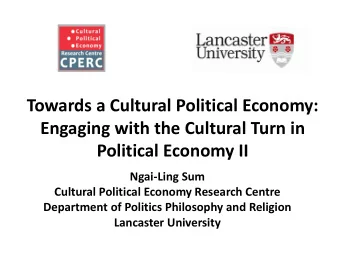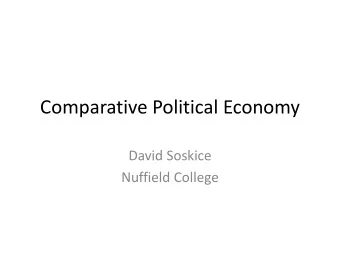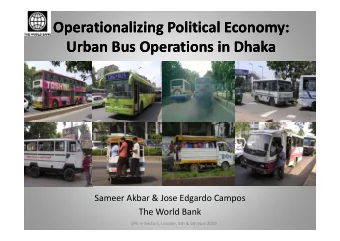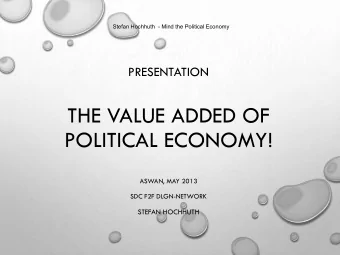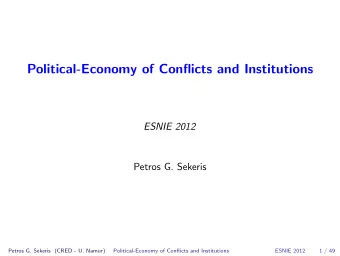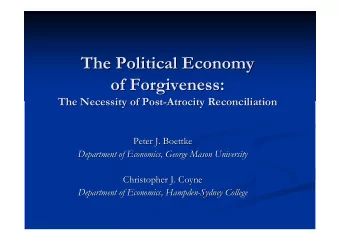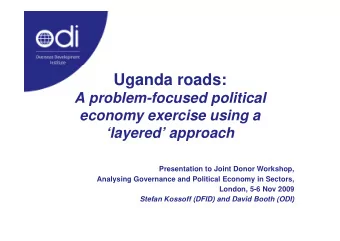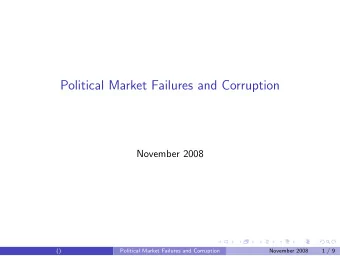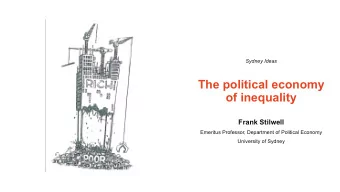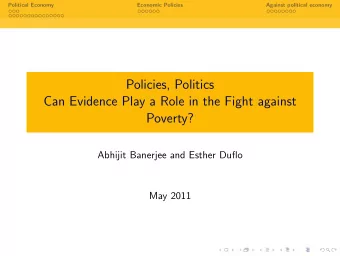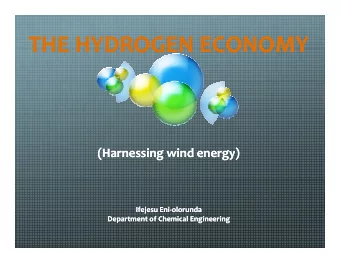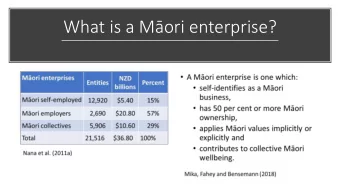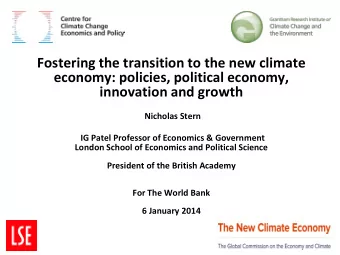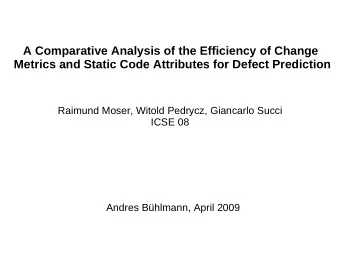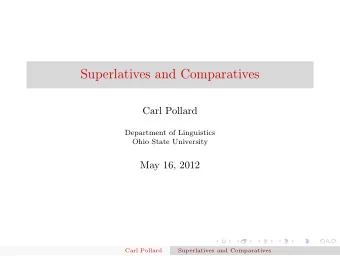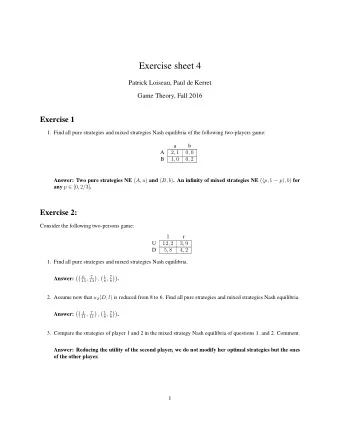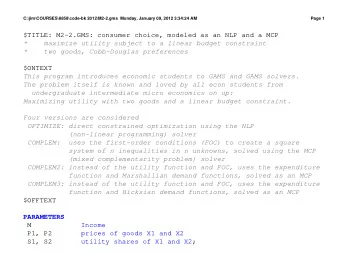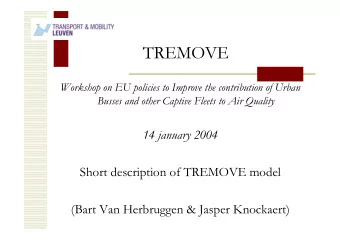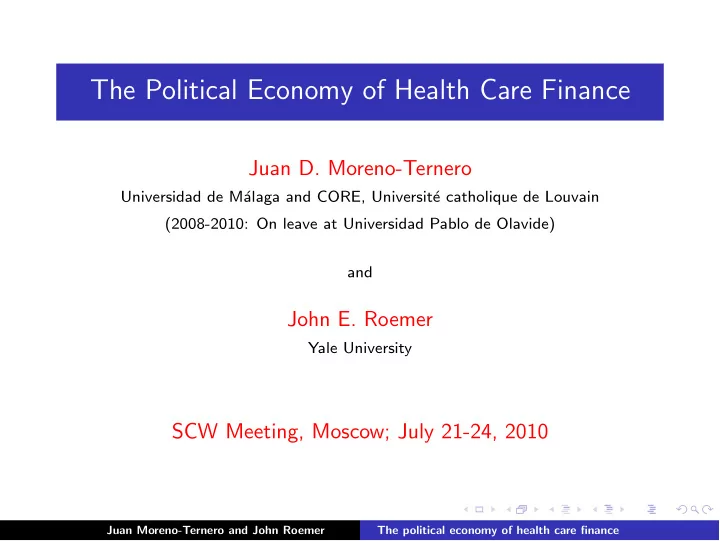
The Political Economy of Health Care Finance Juan D. Moreno-Ternero - PowerPoint PPT Presentation
The Political Economy of Health Care Finance Juan D. Moreno-Ternero Universidad de M alaga and CORE, Universit e catholique de Louvain (2008-2010: On leave at Universidad Pablo de Olavide) and John E. Roemer Yale University SCW Meeting,
The Political Economy of Health Care Finance Juan D. Moreno-Ternero Universidad de M´ alaga and CORE, Universit´ e catholique de Louvain (2008-2010: On leave at Universidad Pablo de Olavide) and John E. Roemer Yale University SCW Meeting, Moscow; July 21-24, 2010 Juan Moreno-Ternero and John Roemer The political economy of health care finance
Financing health care expenditures Financing health care is a priority on the political agenda of advanced democracies Over the past half century, these democracies have usually spent a rising share of total economic resources on health Juan Moreno-Ternero and John Roemer The political economy of health care finance
Financing health care expenditures Financing health care is a priority on the political agenda of advanced democracies Over the past half century, these democracies have usually spent a rising share of total economic resources on health For instance, aggregate health expenditures in the US were: ◮ 5 . 1 percent of GDP in 1960, ◮ 9 . 4 percent in 1975, and ◮ 16 . 2 percent in 2007 Juan Moreno-Ternero and John Roemer The political economy of health care finance
Financing health care expenditures Financing health care is a priority on the political agenda of advanced democracies Over the past half century, these democracies have usually spent a rising share of total economic resources on health For instance, aggregate health expenditures in the US were: ◮ 5 . 1 percent of GDP in 1960, ◮ 9 . 4 percent in 1975, and ◮ 16 . 2 percent in 2007 Most of the OECD countries share a similar trend, as health expenditures represented an average of: ◮ 5 . 4 percent in 1970, ◮ 7 . 7 percent in 1990, and ◮ 8 . 9 percent in 2007 Juan Moreno-Ternero and John Roemer The political economy of health care finance
Some data from the World Health Organization Government expenditures on health as percentage of total government expenditures 1999 2000 2001 2002 2003 2004 2005 2006 Denmark 12 . 4 12 . 6 12 . 9 13 . 2 14 . 0 14 . 2 14 . 8 15 . 6 Finland 9 . 9 10 . 2 10 . 7 11 . 0 11 . 1 11 . 3 11 . 6 12 . 1 Italy 11 . 4 12 . 7 12 . 8 13 . 1 12 . 9 13 . 8 14 . 1 14 . 2 Japan 15 . 8 16 . 0 16 . 8 16 . 7 17 . 1 17 . 8 17 . 7 17 . 7 Norway 16 . 1 16 . 4 16 . 7 17 . 4 17 . 4 17 . 8 18 . 0 17 . 9 Portugal 14 . 3 14 . 9 14 . 2 14 . 7 15 . 6 15 . 4 15 . 5 15 . 5 Sweden 11 . 9 12 . 4 13 . 2 13 . 5 13 . 7 13 . 6 13 . 6 13 . 4 UK 14 . 5 14 . 8 15 . 3 15 . 2 15 . 5 15 . 9 16 . 0 16 . 5 Juan Moreno-Ternero and John Roemer The political economy of health care finance
Some data from the World Health Organization Government expenditures on health as percentage of total government expenditures 1999 2000 2001 2002 2003 2004 2005 2006 Denmark 12 . 4 12 . 6 12 . 9 13 . 2 14 . 0 14 . 2 14 . 8 15 . 6 Finland 9 . 9 10 . 2 10 . 7 11 . 0 11 . 1 11 . 3 11 . 6 12 . 1 Italy 11 . 4 12 . 7 12 . 8 13 . 1 12 . 9 13 . 8 14 . 1 14 . 2 Japan 15 . 8 16 . 0 16 . 8 16 . 7 17 . 1 17 . 8 17 . 7 17 . 7 Norway 16 . 1 16 . 4 16 . 7 17 . 4 17 . 4 17 . 8 18 . 0 17 . 9 Portugal 14 . 3 14 . 9 14 . 2 14 . 7 15 . 6 15 . 4 15 . 5 15 . 5 Sweden 11 . 9 12 . 4 13 . 2 13 . 5 13 . 7 13 . 6 13 . 6 13 . 4 UK 14 . 5 14 . 8 15 . 3 15 . 2 15 . 5 15 . 9 16 . 0 16 . 5 Juan Moreno-Ternero and John Roemer The political economy of health care finance
Financing health care expenditures Several conventional explanations for this phenomenon have been proposed: ◮ aging of the population, ◮ the spread of health insurance, ◮ the growth of income, ◮ supplier-induced demand for medical care Juan Moreno-Ternero and John Roemer The political economy of health care finance
Financing health care expenditures Several conventional explanations for this phenomenon have been proposed: ◮ aging of the population, ◮ the spread of health insurance, ◮ the growth of income, ◮ supplier-induced demand for medical care However, most analysts have concluded that the bulk of the long-term rise resulted from the health care system’s use of new medical services that were made possible by technological advances Juan Moreno-Ternero and John Roemer The political economy of health care finance
Financing health care expenditures Several conventional explanations for this phenomenon have been proposed: ◮ aging of the population, ◮ the spread of health insurance, ◮ the growth of income, ◮ supplier-induced demand for medical care However, most analysts have concluded that the bulk of the long-term rise resulted from the health care system’s use of new medical services that were made possible by technological advances Our aim in this paper is to explore this hypothesis, which has received growing attention throughout the last decade, from a political-economy perspective Juan Moreno-Ternero and John Roemer The political economy of health care finance
Financing health care expenditures Countries typically finance the bulk of their health care expenditures with mixed systems: ◮ Some emphasize taxes ◮ Others emphasize social insurance ◮ Others still emphasize private insurance and out-of-pocket payments In general, there is substantial variation across countries in both the way revenue is raised within each source and the relative importance of each source Juan Moreno-Ternero and John Roemer The political economy of health care finance
Financing health care expenditures Countries typically finance the bulk of their health care expenditures with mixed systems: ◮ Some emphasize taxes ◮ Others emphasize social insurance ◮ Others still emphasize private insurance and out-of-pocket payments In general, there is substantial variation across countries in both the way revenue is raised within each source and the relative importance of each source We propose that the particular system of health care finance of a given democratic country can be seen as an outcome of political competition therein Juan Moreno-Ternero and John Roemer The political economy of health care finance
Political competition In all advanced democracies, citizens organize their political competition through parties that compete in general elections Recently, there has been a growing interest in providing formal models of political competition in general elections Juan Moreno-Ternero and John Roemer The political economy of health care finance
Political competition In all advanced democracies, citizens organize their political competition through parties that compete in general elections Recently, there has been a growing interest in providing formal models of political competition in general elections The most commonly used theory is the Downs-Hotelling model whose principal result is the so-called median voter theorem: Juan Moreno-Ternero and John Roemer The political economy of health care finance
Political competition In all advanced democracies, citizens organize their political competition through parties that compete in general elections Recently, there has been a growing interest in providing formal models of political competition in general elections The most commonly used theory is the Downs-Hotelling model whose principal result is the so-called median voter theorem: ◮ It posits unidimensional political competition ◮ It assumes that candidates do not care about ideology ◮ The sole motivation for running is to enjoy the power and privileges of holding office Juan Moreno-Ternero and John Roemer The political economy of health care finance
In this paper We present a theory of political competition to analyze the problem of health care finance: ◮ In a multi-dimensional policy space ◮ With policy-oriented candidates Juan Moreno-Ternero and John Roemer The political economy of health care finance
In this paper We present a theory of political competition to analyze the problem of health care finance: ◮ In a multi-dimensional policy space ◮ With policy-oriented candidates We restrict our attention to countries mainly financing health care from general taxation and out-of-pocket payments Juan Moreno-Ternero and John Roemer The political economy of health care finance
In this paper We present a theory of political competition to analyze the problem of health care finance: ◮ In a multi-dimensional policy space ◮ With policy-oriented candidates We restrict our attention to countries mainly financing health care from general taxation and out-of-pocket payments Our results provide support for the technology effect: ◮ There exist equilibria in which parties propose to use the most technologically advanced health interventions that exist, even though they are the most expensive ◮ In a dynamic framework, public health expenditures would increase as a consequence of the evolution of technology Juan Moreno-Ternero and John Roemer The political economy of health care finance
Related Literature The literature on the political economy of publicly provided private goods mostly comprises ◮ Public-choice models examining the interaction between voter demand and the supply of publicly provided private goods (e.g., Epple and Romano, 1996; Gouveia, 1997) ◮ Normative models focussing on the efficiency enhancing role of publicly provided private goods (e.g., Guesnerie and Roberts, 1984; Boadway et al., 1998) Juan Moreno-Ternero and John Roemer The political economy of health care finance
Recommend
More recommend
Explore More Topics
Stay informed with curated content and fresh updates.
